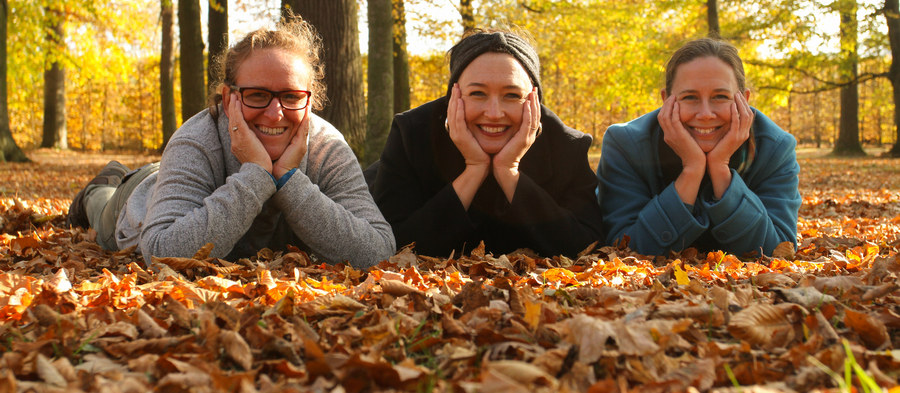Ande Nesmith: I hope the University of Ostrava will host as many of us as possible
Interview with Fulbright Scholar, Dr. Ande Nesmith, about research in social work and differences between Czechia and Minnesota, USA.
Dr. Ande Nesmith is an associate professor at the University of St. Thomas in Minnesota, USA. She earned her Ph.D. in social care and her research interests include teenagers in foster care, environmental justice, engagement of university students in research and the use of technology in supporting socially disadvantaged young people and adolescents. Dr. Nesmith was selected for the Fulbright grant to expand her research into the Czech Republic. She cooperates with the Department of Social Sciences at the University of Ostrava Faculty of Social Studies.
What is the topic of your research in Ostrava?
The research examines the Czech experience with young people leaving institutional care. It includes the outcomes of feelings of young adults after leaving foster care homes or other similar institutions. At the same time, I endeavor to develop long-term partnerships with Czech experts in the field of substitute family care that would continue after my stay in the Czech Republic.
How long is your stay?
Seven months in total. I came to Ostrava in September and I will leave in April. The research will be completed at the end of March and then I am going to a conference on the research of social work in Brussels.
Did you know anyone in Ostrava before you came here?
I did not know anyone in the city but I had communicated with the University of Ostrava for more than a year prior to my arrival via e-mail to prepare for my research. I have been to many European countries and I have visited Prague. However, I did not see any other cities in the Czech Republic but there is a large Czech community in Minnesota. I spent some time in the local Sokol organization and I participated in a yearlong language course with a native Czech speaker.
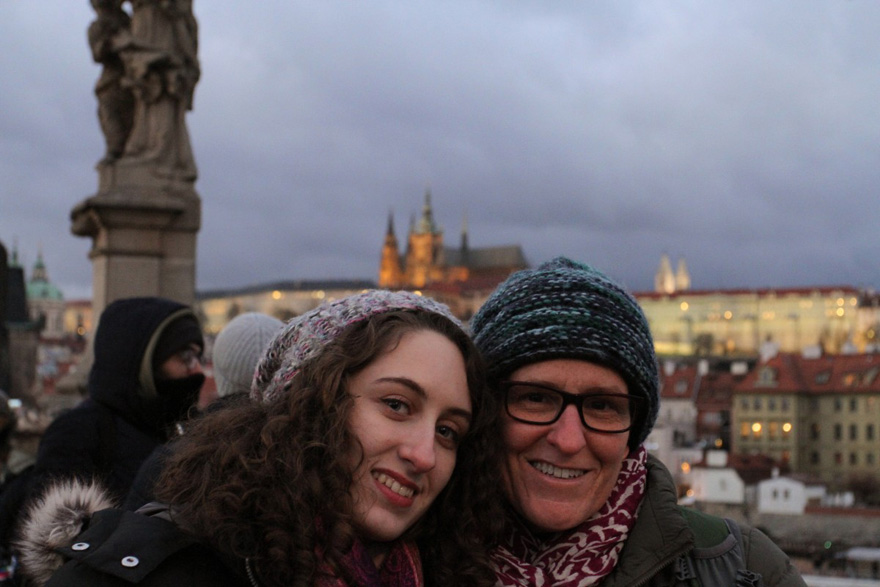
With her daughter in Prague
Fulbright scholarship – the process and the selection of destination
On what basis did you choose the Czech Republic for your research?
For its unique history. Social work as a profession was extremely limited here during communism. After 1989, it got the opportunity to rebound and improve but it is still unexplored within scientific research as it is a new field. The context of a post-communist country differs from the system in the U.S. I am not saying that it is worse. Even though we have advanced in the United States, we are still far from a good system of foster care for children. The role of international politics and the European Union influenced the Czech Republic differently than what we experience in the U.S. I believe that there is a lot we can learn from one another.
How did you learn about the possibility of cooperation with the University of Ostrava?
The Department of Social Studies at the University of Ostrava has participated in the international research in the field of social work. Therefore, I expected that my study could be supported. The European Social Work Research Institute resides there and there are many experts in social work and family law. I have been cooperating with Dr. Monika Chrenková, Dr. Kateřina Cilečková and Tereza Polochová, a doctoral student. Also, Dr. Jitka Návratilová from the Masaryk University has joined our team and I am very pleased about this cooperation between the universities.
Did you consider a different Czech university for your research?
I was thinking about the Masaryk University and the Hradec Králové University but Ostrava was my first choice. All the people at the Faculty of Social Studies, including vice-dean Špiláčková, communicated with me naturally and enthusiastically. It is precisely what I want and need in a research team – people who are zealous for their work.
And I also had a personal reason. I wanted to try to live in Moravia, far from Prague and tourist destinations because I wanted to have a more authentic experience with living in true Czech environment.
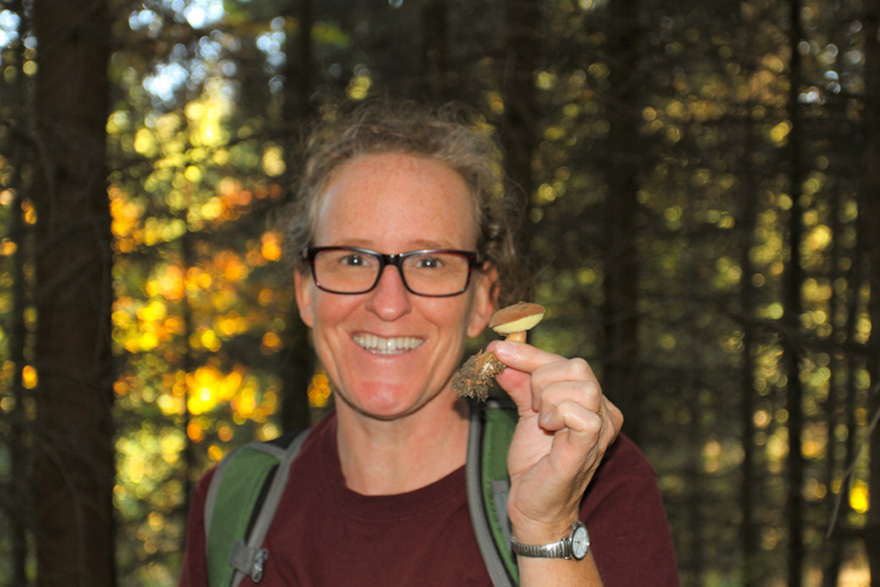
Discovering Czech hobbies – mushroom picking in the Beskydy Mountains
What is the process of getting a Fulbright scholarship?
It is a very difficult process. I had to arrange a hosting university that would cooperate with me plus describe a project plan, in detail, to justify my work and show that it is realistic and that it makes sense to do it in this particular location. The dean from my American university had to write a letter of recommendation and I had to get other protocols approved with regard to the fact that my research includes people. I also wanted to do interviews with children but I only received the permission to include adults in my research.
How long is the process?
It took me six months to get the application ready but I had a large time reserve. Many people can do that in a shorter time period. However, I was lucky to get the scholarship and I want the employees of the University of Ostrava to know that Fulbright also offers grants to them and to people from non-profit organizations. You can do your research in the U.S.! I'm trying to convince some of my Ostrava colleagues to apply to the University of St. Thomas. I can help them with the application for scholarship as well.
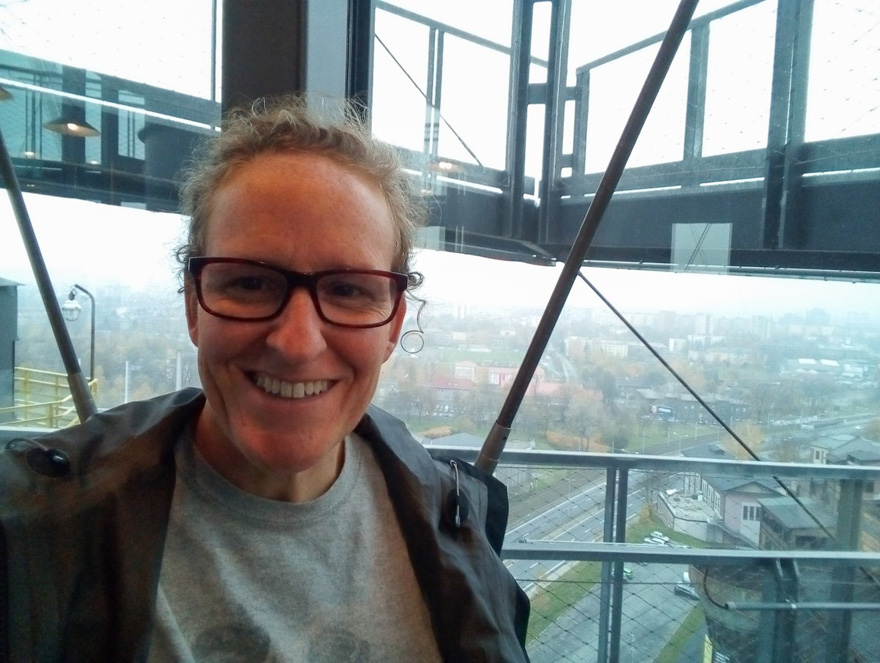
A view of the Bolt Tower
What was your backup plan for the research in case you didn't get the Fulbright scholarship?
I would have come to the Czech Republic even if I hadn't received the scholarship. But the research would take place on a smaller scale during three and a half months and I would have to split my time between the University of Ostrava and the Masaryk University.
Is your research going as planned?
Even better than what I imagined. The research had a very slow start, which was frustrating, but as soon as it started going, it was just getting better and better. A large part of my research involves interviews with people who have the knowledge of foster care. I often need an interpreter, thanks to which I found out how important his or her quality is – it's really important.
Did anything in the research take a different course than planned?
My objective was to perform twenty qualitative interviews. The research is not over yet and I have done forty-five interviews so far. I wanted to get the perspectives from Ostrava, Brno and Prague and in the end I collected data from 13 cities all over the country. I expanded the group of respondents with people who work in and manage child institutions (foster homes, schools, day-care centers), as well as government officials from the ministries and city councils. I spent a lot of time on trains but it was incredibly enriching. I have presented my research at three conferences so far. Our team of five is planning to continue after I leave Ostrava.
About Life in Ostrava
How do you evaluate your stay in Ostrava?
I love Ostrava and I share my love of the city with all Americans I know and also with all the Czechs that haven't visited Ostrava yet. Ostrava might have the reputation of an obsolete industrial city without much culture and with polluted environment but nothing could be further from the truth. Yes, I experienced a few days of smog in winter but I discovered countless beautiful things in Ostrava. Cycling trails, nearby mountains, highly developed art and music scene, and excellent food.
Which place did you like the most?
I've been to so many museums and historical sites, concerts, plays and operas that I can't even count them. The most beautiful experience is from Christmas when I invited my family over to Ostrava. The local Christmas market was splendid and we definitely did not miss the tourist craziness of Prague. Dolní Vítkovice is fascinating, I have never seen anything like that. I took several American visitors there and everyone says that it was the top of their visit in Ostrava.
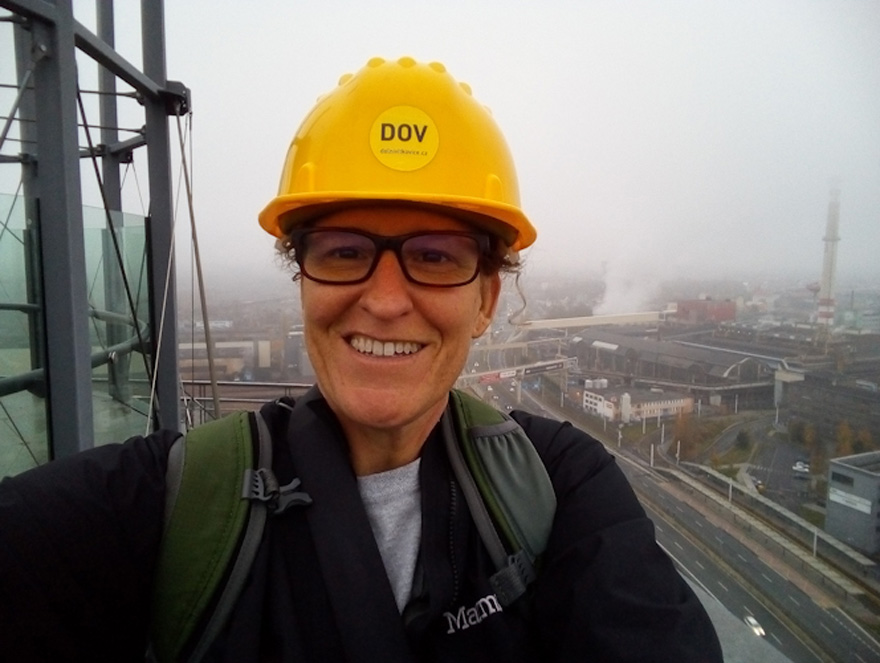
At a tour of Dolní oblast Vítkovice
In the U.S., you live in the agglomeration of Minneapolis-Saint Paul which has 3.5 million inhabitants. How does a life in Ostrava with 300 thousand people compare to that?
In some aspects, it is very similar because Minneapolis and St. Paul consist of many small districts, similar to the local neighborhoods. There is a river that flows through my town just like in Ostrava. However, since we are bigger, there are more options for us, more large events and more shopping areas. Everything is more expensive and more congested in the U.S. I think that Ostrava is the perfect combination that offers a lot of activities without too much traffic.
Is there anything else that you found pleasantly surprising in Ostrava?
I love the local feeling of safety. In the U.S., it is not appropriate to go outside after dark, especially when you are a woman and especially due to the fact that many people carry guns. Also, the method of public transportation in Ostrava impressed me. I just use my bank card for contactless purchase and I can use any means of transport, how easy is that! It is much easier than in Minneapolis. I am similarly enthusiastic about the intercity trains, there are so many of them and they are affordable. If I want to experience a large city, it is easy to go to Brno or even to Prague. The United States are so huge that it is not possible to travel to various regions and the costs are unbearable.
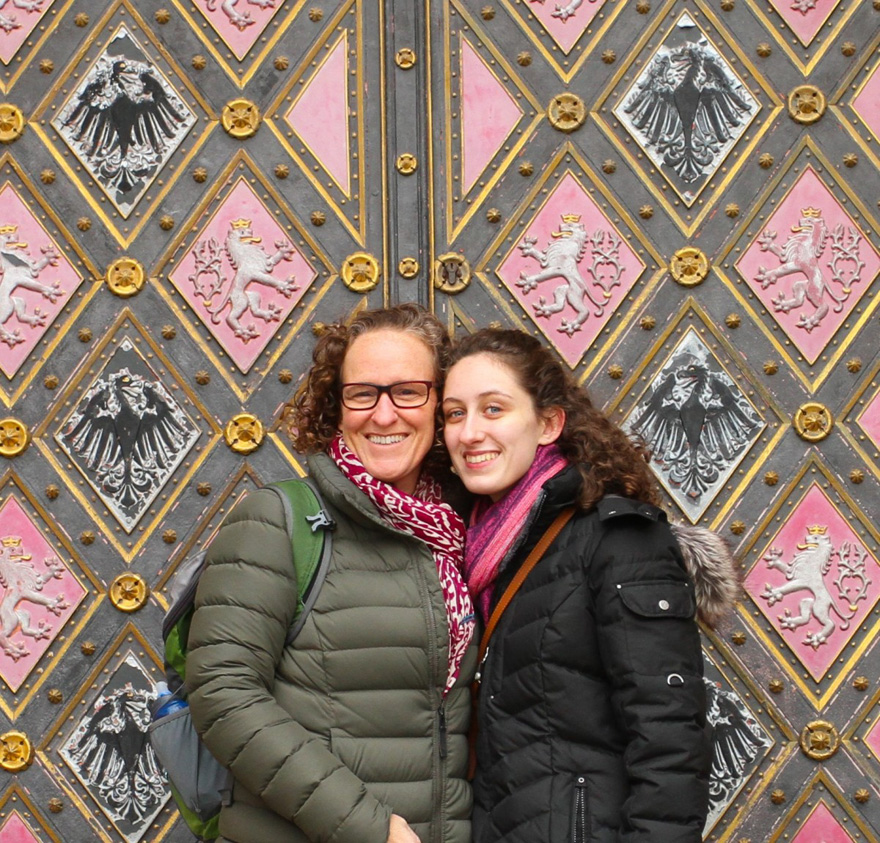
A visit to Vyšehrad with her daughter
How pleased are you with your experience at the University of Ostrava?
Everyone at the Faculty of Social Studies has been kind and pleasant to me. Shortly after my arrival, the university organized a social event at the Plato Gallery, which was a pleasant surprise. The dinner and the entertainment were family-like and I appreciate this effort to build a community in this way. The environment of the former Bauhaus store was artistic and I loved it.
Is there anything that you would improve at the University of Ostrava?
I was surprised with the library, at least the one near the Faculty of Social Studies. There's probably nothing wrong with it but the atmosphere there was different than what I am used to. In American university libraries, students study together in groups, they enjoy their company and they have free access to most materials. Libraries are designed comfortably and the students do not have to be quiet on the main floor. They are living places, libraries are used for building community among students. When I visited the local library, I was surprised that students have to be quiet there and that books have to be preordered. It is not permitted to walk between the shelves and look through the books freely. When I asked the students where they study together, they said that they study alone at home. It's a completely different culture than I know.
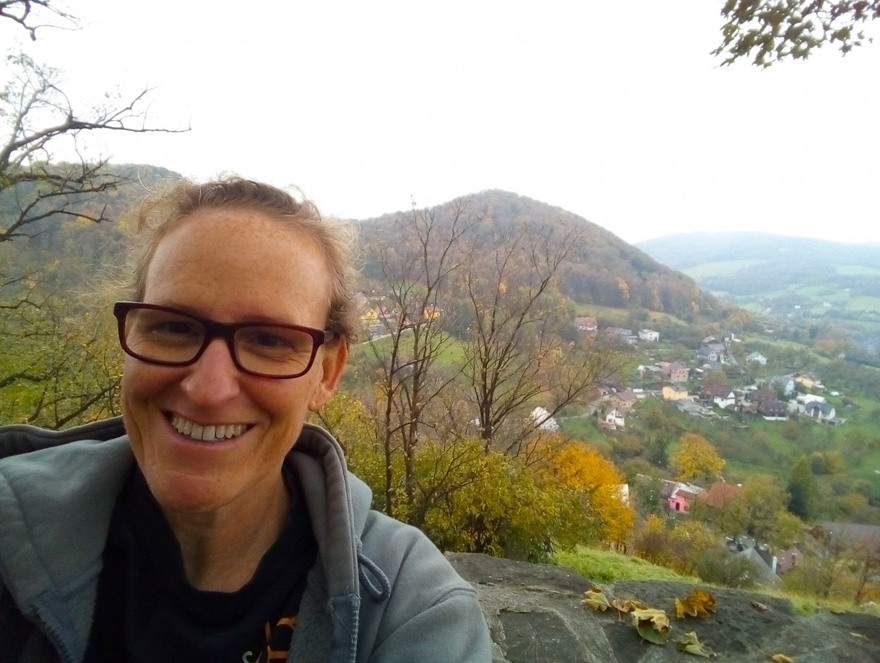
On a trip to Štramberk
Comparing the Czech Republic and the U.S.
What does the field of social work look like in the Czech Republic and in the U.S.?
The education of social workers, curricula and students' expectations are similar in both countries. Both countries put emphasis on children, families and social justice for the marginal groups of population, such as the elderly, the poor, the disabled and ethnic minorities. We don't have such a significant Roma population in the U.S. as in the Czech Republic but there is a large number of African Americans, Latin Americans, Asians and native Americans who all face very similar challenges as the Roma people here. The people in the field of social work use similar practices to work with these groups.
Are there any difference in social work between the two countries?
In the U.S., we dwell on adoption and family reunion. In the Czech Republic, it is more common that children stay in foster care or foster homes until they are 18 years old. Sometimes even until they are 26, if they study at a university. The positive thing is that it brings them much better stability than children in the U.S. have. Also, it is less common to terminate the parental rights and so the children keep contact with their biological families, which is very important for them. But no system is perfect. The Czech government invests quite a small amount in prevention. Therefore, many children who could grow up with their own parents end up in institutional care. If the parents had better support, it wouldn't have to be like that, and this also concerns children with serious disabilities. In the United States, we do much more to let children with disabilities grow up in their homes and communities, and not in institutions.
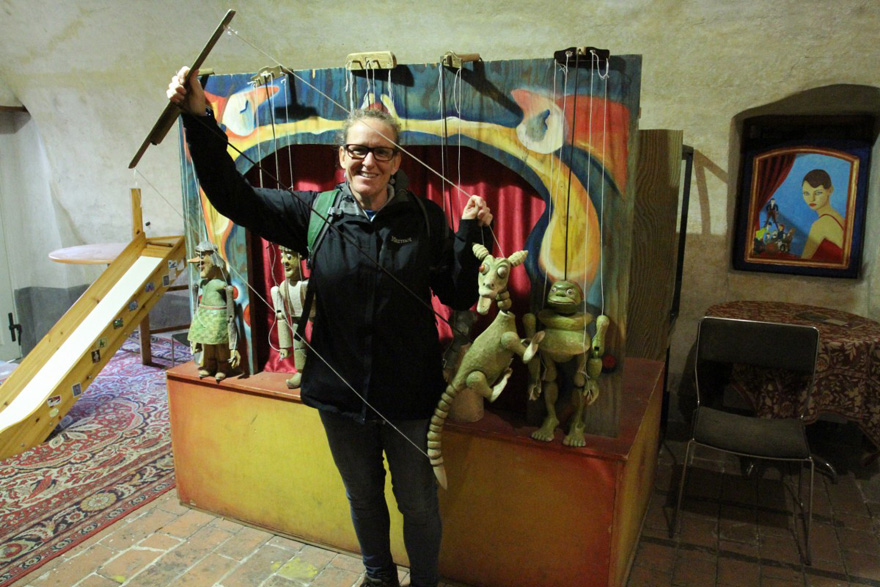
At the Puppet Museum in Český Krumlov
Outside your field, what do you miss in the Czech Republic?
I miss the freely accessible water in restaurants. I miss elevators in hotels and double beds that are not just twin beds pushed together. As a vegetarian, it is sometimes difficult to find a meal at a restaurant that is not all about cheese. There is a lack of up-to-date information on-line – so that when I find information about the opening hours, it doesn't mean that the place is really open. It often happens that I come to a place in the Czech Republic that is supposed to be open according to the Internet and it is closed. I've learned to have a plan B available.
Would you recommend internship in the Czech Republic to you American colleagues?
Definitely. I will definitely try to convince my American colleagues to come here, as well as students within the Fulbright program. Many university graduates who can go abroad and study English, for example. I hope that the University of Ostrava will host as many of us as possible.
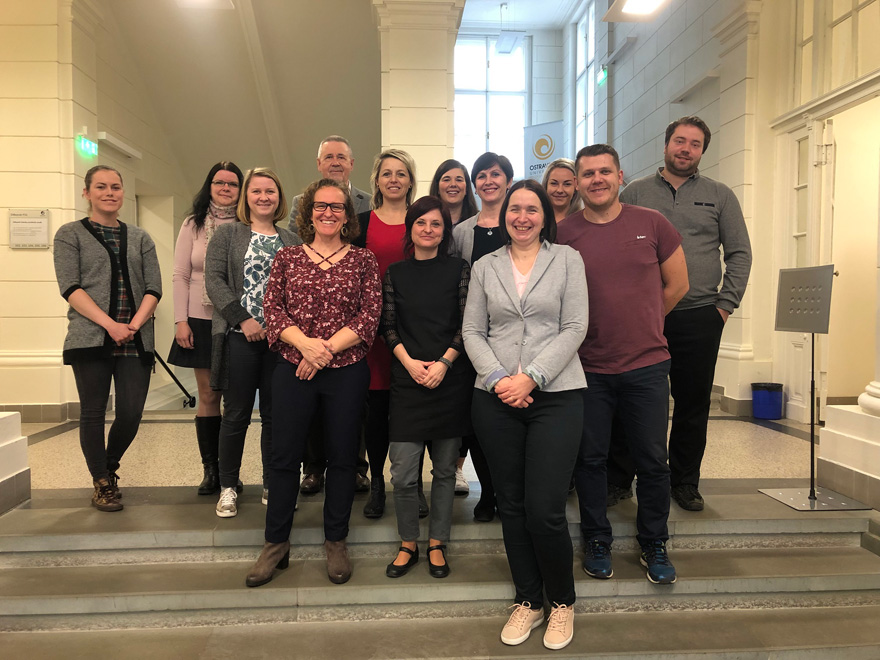
Ande Nesmith with her collegues at the Faculty of Social Studies, University of Ostrava
Updated: 29. 04. 2019

















